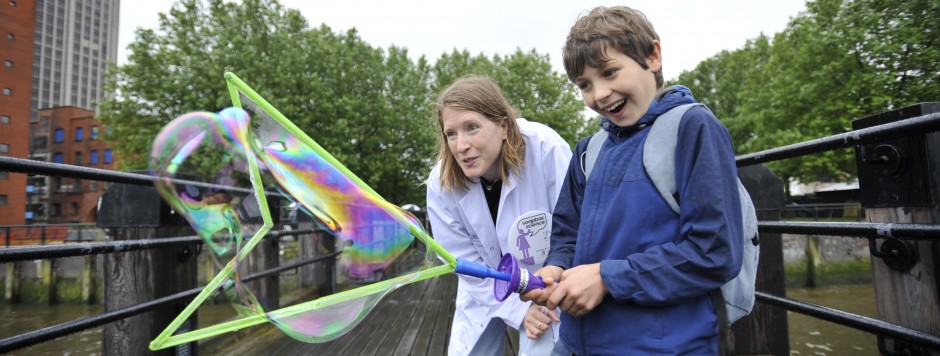 Jenna Todd Jones is based at the School of Experimental Psychology, University of Bristol. Her research is attempting to uncover how the brain interprets the meaning of words in real time, as we read or hear them. Here, Jenna (JTJ) talks to Soapbox Science (SS) about her interests in the arts and sciences, the fun of participating in outreach activities, and the wonder of bilingualism.
Jenna Todd Jones is based at the School of Experimental Psychology, University of Bristol. Her research is attempting to uncover how the brain interprets the meaning of words in real time, as we read or hear them. Here, Jenna (JTJ) talks to Soapbox Science (SS) about her interests in the arts and sciences, the fun of participating in outreach activities, and the wonder of bilingualism.
SS: Hi Jenna! Very nice to have you as a Soapbox Science speaker this year. To start with, maybe you could tell us how you got to your current position?
JTJ: I first studied for an undergraduate degree in psychology at Bangor University after taking psychology at A-Level, although the rest of my A-Levels were very artsy like literature and theatre! Following that I studied for a masters degree in clinical neuropsychology after developing a keen interest in the brain. Due to encouragement from my professors at Bangor I decided to apply to study a PhD and have had an amazing four years here at Bristol since.
SS: What, or who, inspired you to get a career in science?
JTJ: Truthfully I began life as an Arts student, I was a musician and enjoyed acting and literature; however, my father (a school teacher) had always been quite interested in child psychology and he would sometimes bring home academic journals related to psychology. I remember first picking up and reading one cover to cover (The Human Givens Journal, ETSI) and then waiting impatiently for the next quarterly publication. Parallel to this I had begun studying psychology at A-level – I was hooked, and applied to study it at university. My masters degree in particular guided me towards a scientific career, working with brain trauma patients and stroke victims helped me to see how worthwhile scientific research can be.
SS: What is the most fascinating aspect of your research?
JTJ: For me the most interesting part is being able to use some of the most advanced tools in the world to study the brain. Using technologies like electroencephalography (EEG) and magnetic resonance imaging (MRI) my research is attempting to uncover how the brain interprets the meaning of words in real time as we read or hear them. My latest experiments have begun to show some evidence that bilingual people actually interpret words they read in both their learned languages simultaneously, before going on to choose the correct meaning. For example, when reading the word “chat” a French-English bilingual might consider the meaning in both languages, i.e a conversation and a cat, before choosing which is correct, perhaps due to the context of a sentence (e.g. “Let’s have a chat”).
SS: So what attracted you to Soapbox Science in the first place?
JTJ: It is the responsibility of scientists who are funded by the public to communicate their research back to the public. The reporting of scientific research should be transparent and, as much as possible, interesting and fun. I have been participating in outreach work for almost four years now and I have loved every minute of it. From the first utterly nerve-wrecking talk on the brain in front of a classroom of Bristolian 8 year olds, to a live open debate on neuroscience at the Barbican Centre in London. Soapbox Science seems to me a unique platform (ha, get it?) for scientists to discuss interesting scientific research directly to the public, and I very much look forward to sharing some of the most fascinating quirks of the brain.
SS: Sum up in one word your expectations for the day – excitement? fear? thrill? anticipation?
JTJ: Pins-and-needles (is that cheating?!)
SS: If you could change one thing about the scientific culture right now, what would it be?
JTJ: I’m a big believer in increasing support for young people in low socioeconomic status areas so that they might be encouraged to consider science as a career. I grew up in a very poor area in the Valleys of South Wales and I had little understanding of what a scientist was as a child, much less had ever met one! I hope that in the future the system can change so that young school students are consistently inspired, encouraged, and incentivised by real-life scientists.
SS: What would be your top recommendation to a female PhD student considering pursuing a career in academia?
JTJ: There is currently a lively debate about how and why women do not necessarily continue into an academic career following a PhD (a debate that becomes increasingly relevant to me as I approach the end of my PhD). Perhaps women undersell themselves, perhaps they are shut out, or perhaps they have other paths in mind. From my position on the ladder I have one piece of advice: ignore the chatter, if you really want the life of an academic, go and get it!

You must log in to post a comment.